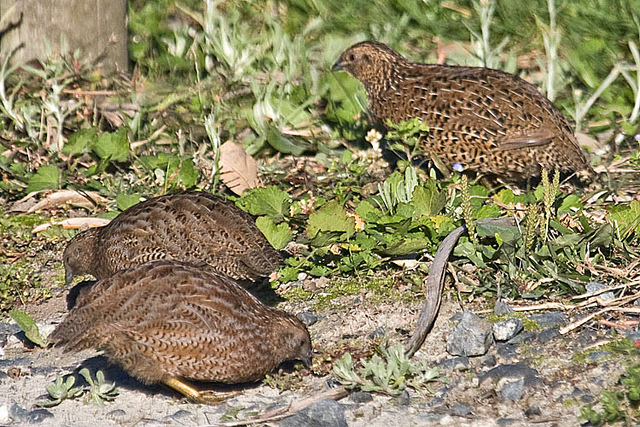Beyond Chickens: Poultry to Keep at Home
 When most people hear poultry at home, they think of chickens, thanks to the current trend of urban cluckers. It turns out that there are a lot more options than that, and I talked to Medocino County organic farmer Gowan Batist, about some of the varied poultry people can keep at home, including some birds that can be kept indoors, for urban gardeners with especially limited space. (For information on urban goatherding with minimal space and plumbing, Bay Area urban farmer, Kitty Sharkey, advises.)
When most people hear poultry at home, they think of chickens, thanks to the current trend of urban cluckers. It turns out that there are a lot more options than that, and I talked to Medocino County organic farmer Gowan Batist, about some of the varied poultry people can keep at home, including some birds that can be kept indoors, for urban gardeners with especially limited space. (For information on urban goatherding with minimal space and plumbing, Bay Area urban farmer, Kitty Sharkey, advises.)
Meet the coturnix quail, Gowan’s personal favorite.
“I would really love to see quail replace chickens as the urban poultry of choice,” she explains, pointing out that their overall needs are much lower than those of chickens, while they reliably produce delicious, high-quality eggs. Coturnix quail can be comfortably kept in a large terrarium or hamster cage inside or outdoors, and there are usually no municipal limitations on keeping them, which is not always the case with chickens.
These small birds mature quickly, eating a mixture of poultry scratch and egg-laying mixture. Like chickens, they can also eat food leftovers; they particularly fancy salad greens. They’re also easy to tractor, for people working with poultry in their gardens, and unlike chickens, they don’t need a lot of vertical height to feel comfortable. In fact, they prefer low cages with some hiding spots, because they’re ground-dwellers.
Coturnix quail eggs are available for people who want to hatch at home, and it’s also possible to buy through a breeder. She does warn would-be quail keepers to watch out, because the birds are startle fliers, meaning that they will fly straight up when alarmed. It can help to keep them in a pen accessed through the side, and to be careful when moving them to reduce the risk of injuries; if the roof of a pen is high enough, coturnix quail can actually break their necks when they leap up out of fright.
The options don’t stop with quail. Gowan also loves runner ducks, who have an upright skeletal structure that is rather endearing. These “funny little guys,” as Gowan calls them, don’t scratch like chickens do, and are voracious eaters of slugs, snails, and bugs. She recommends letting them run loose between raised beds covered in wire to eliminate pests that might be hiding in grass and weeds.
A pond isn’t necessary for keeping runner ducks, although they do need a reliable source of water. Because they enjoy playing in their water, Gowan recommends a fountain filled with rocks, which will limit muddiness and keep the water clear. Ducks are also easy to shelter because they don’t require roosting space, and they will happily nest on the ground, producing rich, nutritious eggs that are ideal for baking. Like coturnix eggs, they have a high loft that results in truly fantastic pastries.
For those interested in keeping chickens, it’s important to be aware that many commercial coops sold for urban gardening are not large enough to keep chickens humanely. She recommends three feet of roost space per bird, and 20 square feet to move around in comfort. Chickens like to scratch, dustbathe, and run, so it’s important that they have enough room for natural behaviors to prevent aggression and stress. The birds will also need comfortably-sized nestboxes and regularly changed bedding. You'll need to hire a local carpenter to build a custom coop for you, or DIY if you're skilled at carpentry.
Chickens require a blend of scratch and a laying mix, and it’s advisable to periodically add oyster shell or another calcium source to reinforce their eggs. As with other poultry, they produce a lot of manure which can be used to make compost tea for crops. Gardeners can also mix the manure and poultry bedding in with compost to help it break down quickly into a rich soil blend for the garden.
In urban environments, people may produce more compost than they need with poultry, in which case alternative disposal methods like an urban composting service could be considered. These services are available in some cities, and in other cases people may be able to network with a local urban farm or community garden to see if they need more composting materials.
Gowan recommends staying away from geese and guineafowl in urban environments because geese can be aggressive, and guineafowl are infamous for their obnoxiousness. In addition, they’re very secretive egg layers, which can turn every egg collection into an unwanted treasure hunt. If you miss an egg, Gowan notes that you’ll surely smell it later.
Looking for a Pro? Call us (866) 441-6648

Landscaping Average Costs
Landscapers Experiences

Fast Furnace Repair That Saved Me From Getting Ripped Off

The Best Pest Control Service For My New Florida Home



